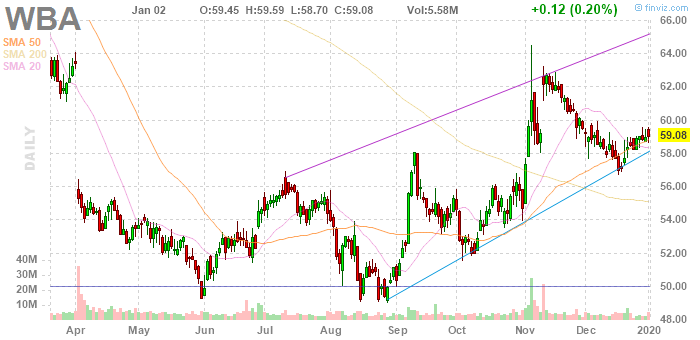The key question facing U.S. stocks at the moment is: how much is left? The bull market almost certainly will enter its twelfth year in March (though by some measures, it ended, however briefly, in December 2018). The S&P 500 rose 29% in 2019 alone; the NASDAQ Composite performed even better. Equities are at all-time highs, and valuation multiples seem much the same.
Friday’s big stock charts focus on three stocks for which the key question is similar to that of the market as a whole. These aren’t necessarily stocks that have led, or in two cases even joined, the broader rally. But all three closed 2019 on a high note and in an uptrend.
As a result, for these names investors can wonder how much of a rally remains. In all three cases, near-term trading could set the tone for the remainder of 2020. And in all three cases, these big stock charts suggest at least some reason for caution.
Procter & Gamble (PG)
Procter & Gamble (NYSE:PG) was one of the most impressive stocks of 2019. The 36% rise in PG stock perhaps doesn’t seem that spectacular relative to the 29% increase in the S&P 500 or even the 22% gain for the Dow Jones Industrial Average, of which PG is a component. But in context, the move is close to extraordinary.
After all, PG is a mega-cap and defensive name. Both characteristics suggest the stock should underperform in a bull market. CPG (consumer packaged goods) stocks as a whole posted smaller returns than the market, yet P&G stock outperformed pretty much every peer. At the same time, the stock managed to reverse a long-stagnant trend: shares gained less than 1% total in the previous four years.
With all that backward-looking good news, however, the first of Friday’s stock charts suggests a more muted view looking forward:
- PG stock simply has stalled out. Resistance held at $125 in September and October, while a move above those levels last month quickly faded. Shares now are challenging the support line of the multi-month uptrend, and the 50-day moving average after falling through the 20DMA. This looks like a stock ready to roll over, with the next level of support at $120 followed by the 200-day around $115.
- Fundamentally, there’s a case for a modest decline as well. After a decade marked by cost-cutting, reorganization, and divestitures, P&G found the recipe for growth in fiscal 2019 (ending June). But there’s simply not much left in the way of catalysts. This now is a company likely to post mid-single-digit net profit growth whose stock trades at 25x the FY20 consensus earnings per share estimate. That’s a potentially dicey combination, particularly given that historically PG received at most a P/E multiple in the low 20s.
- With third quarter earnings due toward the end of this month, there is a potential downside catalyst if results disappoint. Rival Unilever (NYSE:UL,NYSE:UN) delivered a warning on demand in key regions last month. P&G’s own second quarter report in late October was not well-received.
- It’s possible the market, as it has in recent years, keeps bidding up names it views as quality. But there’s a strong case that at the least, the performance of PG stock this year will be much less impressive than it was in 2019.
Walgreens Boots Alliance (WBA)
Walgreens Boots Alliance (NASDAQ:WBA) seems to have found its footing. Shares have bounced about 20% since hitting a six-year low in late August. A cheap valuation, takeover speculation and better results across the sector have contributed.
The question looking to 2020 is if the uptrend can hold. Both the second of our big stock charts and fundamental analysis suggest that it should:
- The technical picture still looks reasonably solid after the rally over the past two weeks. WBA stock saw a “golden cross” in November, as the 50DMA crossed above the 200DMA. That pattern didn’t have much of an immediate effect, as shares kept falling. But with a bottom seemingly in, and WBA riding the 50-day in recent sessions, the longer-term uptrend seems confirmed at the moment.
- Fundamentally, WBA is one of the Dow Jones’ cheapest stocks, at less than 10x forward earnings. Rivals Rite Aid (NYSE:RAD) and CVS Health (NYSE:CVS) have shown signs of life after their recent earnings reports, with leveraged RAD stock in particular soaring. Walgreens earnings on Wednesday look like a potential catalyst.
- That earnings report, however, presents a risk on both fronts. A sell-off next week would breach the uptrend established since late August. Shares probably would need to rely on the 200DMA for support. And with rivals doing better, a weak report might suggest that Walgreens has execution issues in addition to the margin and sales problems that have pressured the industry in recent years.
- I wrote this week that Walgreens was one of the 2019’s losers that likely would be a winner in 2020. I still believe that will be the case. But for that to happen, Walgreens earnings next week need to set a bullish tone.
Harley-Davidson (HOG)
Harley-Davidson (NYSE:HOG) managed to put in a bottom in late August. An eight-year low proved the nadir of an inverse head-and-shoulders pattern, and a gap up after third quarter earnings allowed the stock to re-test resistance above $40.
Since that test failed, however, HOG stock has struggled. And the third of Friday’s big stock charts suggests more downside ahead:
- Shares have exited out of an uptrend established from August lows (which actually is a slightly narrowing ascending wedge). They’ve breached the 50-day moving average as well after a golden cross formed in early November. The 200-day moving average at $36 is the next key level. Below $36, support looks limited, and there’s a technical argument for a potentially severe sell-off.
- Looking to the monthly chart, the broader trend becomes apparent. And the rally of late looks like an almost parabolic move against that primary trend — a move that usually reverses. For now, the gains in recent months look more like a “dead cat bounce” than a sustainable reversal.
- Fundamentally, HOG stock looks worrisome as well. Shares are cheap at less than 11x next year’s consensus EPS estimate. Progress on the trade war front should help the company. But profits are heading in the wrong direction, and rival Polaris Industries (NYSE:PII) is taking share with its Indian Motorcycles nameplate. Demographics hardly seem to favor Harley-Davidson, either. Both the fundamentals and the third of our big stock charts make HOG stock look more like a value trap than a value play. That in turn suggests investors should look elsewhere for returns in 2020.
As of this writing, Vince Martin has no positions in any securities mentioned.



